In our last article on Perfectionism in Children Symptoms & Signs, we spoke on the trend on how parents cling to the false notion that they are being ‘good parents’ by protecting their children from experiencing failure.
Sadly, ‘well-meaning parents refuse to see that what they are doing is actually more damaging. Making them ‘perfect ‘enough to survive in the highly competitive world. Their concerns prevent their children from honing the multitude of skills that they will need to cope up with the peaks and the valleys they will traverse in the journey of their life.
Perfectionism if not moderate in nature should raise an alarm. Chasing perfectionism mirrors an array of mental health disorders, such as eating disorders, anxiety disorders and even going to the extent of causing self-injury. Even if too much perfectionism may not necessarily translate into a health concern, but letting it over-ride your child would mean they becoming hysterical even if they miss the highest score in their class by only a couple of marks.
6 Steps to Overcoming Perfectionism
The following ideas can help you moderate your child’s perfectionist nature:
1. Being not so perfect is cool
It is important that you evaluate the messages that you give to your child. Let your actions mirror your words. If you tell them high grades do not matter to you, but if you are constantly talking about how important these things are all the time, your child may feel a burden to perform and bring the laurels home. Let them know that your love for them is from an unconditional and perennial source in your heart and not based on how they perform in school.
2. Your child is a part of you, not you
Do not derive your own sense of worth from your child’s accomplishments. Stop living your dreams through them.
3. My Hero, like me
Give them books and movies that make role models out of real people or introduce them to people who succeeded after a set of failures. For instance, if you are citing examples of famous people, you can talk about Albert Einstein who failed 999 times before making a path- breaking discovery. Don’t show him a hero he can’t be.
4. Be a catalyst in their growth
The greatest gift parents can give their child is both roots and wings. Allowing children to fly and traverse a path on their own even if it means them faltering and falling. Allow mistakes to happen. Mistakes give a lifetime of lessons and the confidence to soar ahead and higher. Assist if you must but do not become their wings.
5. Watch what you say
“Wow, you worked so hard to learn that tough material. God luck for your test,” is more positive than saying “Don’t worry, I know you’ll get an A, you always do!” Also instead of using the word mistakes, replace it with the term ‘obstacle’ or ‘stumbling block’
6. Make them follow this mantra
“Always dream and shoot higher than you know you can do. Do not bother just to be better than your contemporaries or predecessors. Try to be better than yourself.” ― William Faulkner








Be the first one to comment on this story.